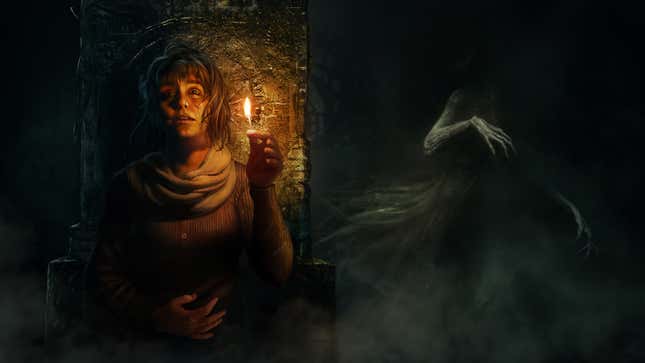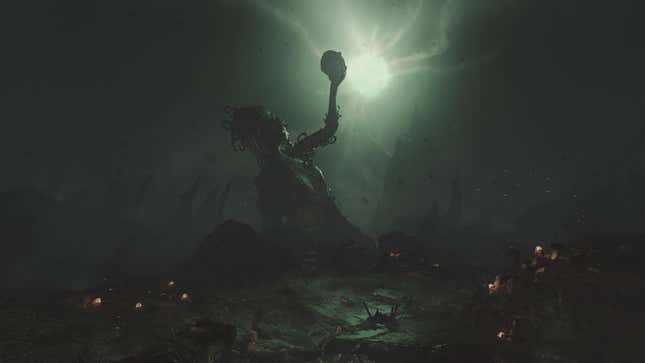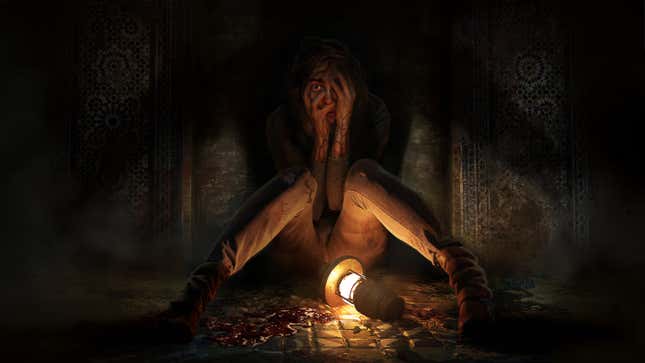
The only scary thing in Amnesia: Rebirth is motherhood. The monsters are rare and dispersed enough to be manageable threats, and the atmosphere is less oppressive than other Amnesia games. Rebirth did not scare me the same way The Dark Descent or its far more terrifying older sibling Penumbra: Overture did. But it’s a game about motherhood and all its physical and mental horrors. For women in America right now, especially Black women, motherhood is scary as shit.
The following mini-review of Amnesia: Rebirth will contain multiple, big-time spoilers. Reader beware.

In Amnesia: Rebirth you play as Tasi Trianon, a talented artist cum engineering drafter who, with her husband Salim, are on their way home to Paris after a job abroad when their plane crashes in the Algerian desert. Tasi wakes alone, with no memory, in the twisted wreckage of the plane. She journeys into the desert heat to find what befell the rest of her companions and her beloved Salim.
Rebirth subverts your expectations right from the beginning by having you seek darkness instead of avoiding it. Initially, you are trapped in the desert and must cleave to the shadow of rocks to avoid the deadly heat. Stay too long in the burning sun and you’ll start to hear a gross squishing noise that I guess is supposed to evoke the feeling of your brain melting but reminds me of “macaroni in a pot” from Cardi B’s “WAP” (but devoid of it’s fun, sexy context).
Once you find refuge in a cave, that familiar system of avoiding the darkness returns. In Rebirth, the “Sanity” mechanic is still in place but is thankfully given the less stigmatizing name “Fear.” You progress through each area with matches and eventually an oil lamp to stay out of the darkness to keep your fear low. Remain too long in darkness and the edges of your vision will darken with black, smoky tendrils while too-bright images flash before you, accompanied by short pops of screaming. Fail to find or produce a source of light, and the game will prompt you to spin the analogue sticks as fast as you can before you lose control of your body. You wake up some earlier distance away, but with all your puzzle progress intact.
There are puzzles to solve—some clever, some tedious—, notes to find, and monsters to avoid, but most of the game is you and Tasi doing your best to keep the dark at bay. Eventually you’ll learn that a strange device on your wrist, called a Travellers Amulet, lets you open portals wherever you see a shimmering wall. The portals take you to another world, where you’ll come across notes and audio logs that mention an Empress, her servants, and the horrific way she’s able to remain in power. Fans of The Dark Descent lore will recognize some references that I won’t spoil here, but suffice it to say, the two games share a world.
I wanted to play Amnesia to be scared. My partner would call me a liar and a big chicken because I hate it when he scares me (a very easy thing to do), but I actually find the anticipatory dread of finding out what’s behind that dark corner to be thrilling. It’s like a cheap way to get an adrenaline fix in the current reality of covid-shuttered theme parks. But Rebirth sadly didn’t deliver. Once I got over the very first encounter with a monster—called ghouls—every other run-in was predictable: You see the monsters close-up early and often, neutering the dread they might inspire if they were unknown and kept at a distance. In later levels the identity of the monsters makes them too familiar to be scary.

The atmosphere similarly failed to frighten me; areas are too bright and too open. It’s weird that I can suffer “fear” damage standing in a dark doorway even though the room behind me is brightly lit. There’s a moment in the game where you’re exploring an abandoned fort full of the mangled bodies of French soldiers, but I couldn’t help but think “meh, they’re colonizers,” and continue on.
That’s not to say there are no truly scary moments. At one point in the game you’re forced to dive underwater to avoid a monster’s searchlight-like gaze. The monster moves slowly, and your face is inches from the water’s surface. You have to pop your head up to breathe and risk the monster catching you, or stay still too long and drown. Thanks to Sonic’s anxiety-triggering “you are about to drown” countdown, any time I spend underwater triggers that menacing jingle in my head, making that encounter frightening. Unfortunately truly horrifying moments like those are rare.
Except when the game focuses on motherhood. Early on in the game Tasi realizes she is pregnant. Tasi’s body rapidly contorts to fit the watermelon suddenly growing in her belly. She feels the baby kick, which to me reads as “there is a thing moving in you that you cannot control and can kick powerfully enough to break ribs”. Babies even can even leach the calcium from your bones, which can lead to your teeth falling out: Babies! They eat your teeth!
The horror of Tasi’s situation is compounded by running from monsters while carrying a child. That knowledge of her being pregnant and that I was in charge of her every movement created an instant mental/emotional connection that compelled me to be afraid on behalf of her and her child, even though neither is a real person. I took extra care to go slowly and carefully lest I run stomach first into a wall or fallen beam. Whenever Tasi fell through a floor or got knocked around, I found myself screaming “No no no!” along with her while reflexively putting an arm over my own stomach. I know pregnant people aren’t totally fragile, but seeing her get banged up deeply upset me—instilling a bone-deep fear that somehow this game was going to make this woman lose her baby or die herself through pregnancy-related trauma. I don’t need a video game to remind me any more of death from pregnancy-related trauma: Black women in America are four times more likely to die from complications in childbirth than their white peers (and America is already pretty bad about its maternal mortality rates). My own sister had a scare after giving birth to my nephew two years ago. The perils of pregnancy in the game also felt more fraught to me given that this week, in a not-really-startling-anymore display of cowardice from one party and rank hypocrisy from another, the US Senate confirmed Justice Amy Coney Barrett to the Supreme Court. Her confirmation tips the right-aligned court even further in the conservatives favor, so if Roe v. Wade, the case that keeps abortion legal in the country, ever comes before the court, millions of people could loose access to abortion care.

One of my deepest fears is my birth control failing and getting pregnant and not having the resources to terminate safely and legally. Controlling Tasi as she periodically rubs her rapidly growing belly is supposed to be a sweet and touching moment, but it unnerved me. When I play video games, I like to inhabit the characters I control, instilling in them my thoughts and feelings as I pilot them through the game. Being Tasi, pregnant while being preoccupied with escaping death as the baby inside me grows from a bean to a bowling ball in the space of a few in-game hours, freaked me the hell out. It’s not supposed to be scary. Tasi wants this child, but her situation made me think of how I would feel if I were to get pregnant now. The fear and helplessness we both feel, even in different situations and for different reasons, made the game terrifying.
I haven’t played another game where you control a pregnant person (unless you count being implanted with a xenomorph chestburster in Alien 3). Moms in games are usually either not present, not playable, or don’t live very long. Amnesia: Rebirth isn’t scary for its horror or its puzzles, but in the way it tells a story about motherhood. There are the standard tropes that, when you find them, might inspire an eye-roll or two, but I found the mere action of playing a mom refreshing and scary.




